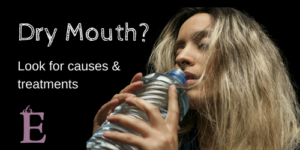Dry mouth may be more common than you think.
Dry mouth is a condition that 1 in 4 people suffer chronically from. Adequate production of saliva is vital for oral health, assisting us in swallowing correctly, preventing tooth decay, and maintaining overall wellness. While it is common to experience dryness from time to time, those with extreme dry mouth should know what to watch for and how to get relief from dry mouth symptoms.
Why is my mouth suddenly dry?
Dry mouth is caused by a decrease in saliva production, which typically happens as we age. However, the condition can also result from other controllable factors, including the types of medications we take and our daily habits. In fact, there are over 600 types of prescription medications that can cause dry mouth, including common medications used to treat blood pressure and gastro issues. Deficiencies in essential vitamins such as vitamin A and riboflavin can also contribute to dry mouth. Sniff… are you a sufferer of seasonal allergies? When we’re congested, we often “over-breathe” from our mouths rather than our noses, which leads to excessive dry mouth. Finally, certain medical conditions and their treatments can also contribute to dry mouth. For instance, cancer patients undergoing chemotherapy and radiation commonly report dry mouth as a side effect of their treatment.
Is it “normal” or is it dry mouth?
Is it just a temporary condition or do you require treatment for dry mouth? Watch for these persistent symptoms:
- Persistent dryness and/or soreness in the mouth/throat
- Thick or sticky saliva production
- Increase in plaque, tooth decay, and gum disease
- Bad breath
- Changes in speech, swallowing, talking, and sense of taste
Relief for dry mouth
The good news is that there are a variety of treatments and remedies for dry mouth. Some of them involve consulting with experts but others are simple home remedies. Here’s what you can do!
- Talk with a doc! Examine the medications you are taking and consult with your doctor on whether you can alter the meds and/or adjust dosage to help alleviate dry mouth symptoms.
- Drink up! Since dehydration is a major dry mouth culprit, increase your H20 intake to stimulate saliva production. Keeping the mouth moist will assist with the process of chewing, swallowing and digestion.
- Step up oral hygiene! Lack of saliva production puts you at greater risk for decay. Increase your daily brushing regimen and switch to a fluoride toothpaste to protect gums and teeth.
- Reach for the mints! It’s all about keeping the mouth moist, so stock up on your favorite breath mints, gum and sucking candies (sugar-free, of course!) to aid in saliva production.
- Just breathe! Through your nose, that is. Seek treatment for snoring, if necessary, to prevent “over-breathing” from the mouth. Also, use a humidifier to promote healthy nighttime breathing.
- Avoid irritants! Steer clear of excessive alcohol, caffeine, tobacco and very spicy or salty foods, which dry the mouth.
- Visit your dentist regularly! This is a no-brainer for maintaining optimal oral health. However, if you’re suffering from dry mouth, your dentist can intervene and provide relief. For example, Dr. E recommends a product called Neutrasal to help patients with extreme dry mouth. Neutrasal is a prescription rinse that replaces and mimics natural saliva.
Don’t let dry mouth inhibit your healthy lifestyle. Know the signs and recognize that you can be proactive when it comes to relieving dry mouth symptoms!


